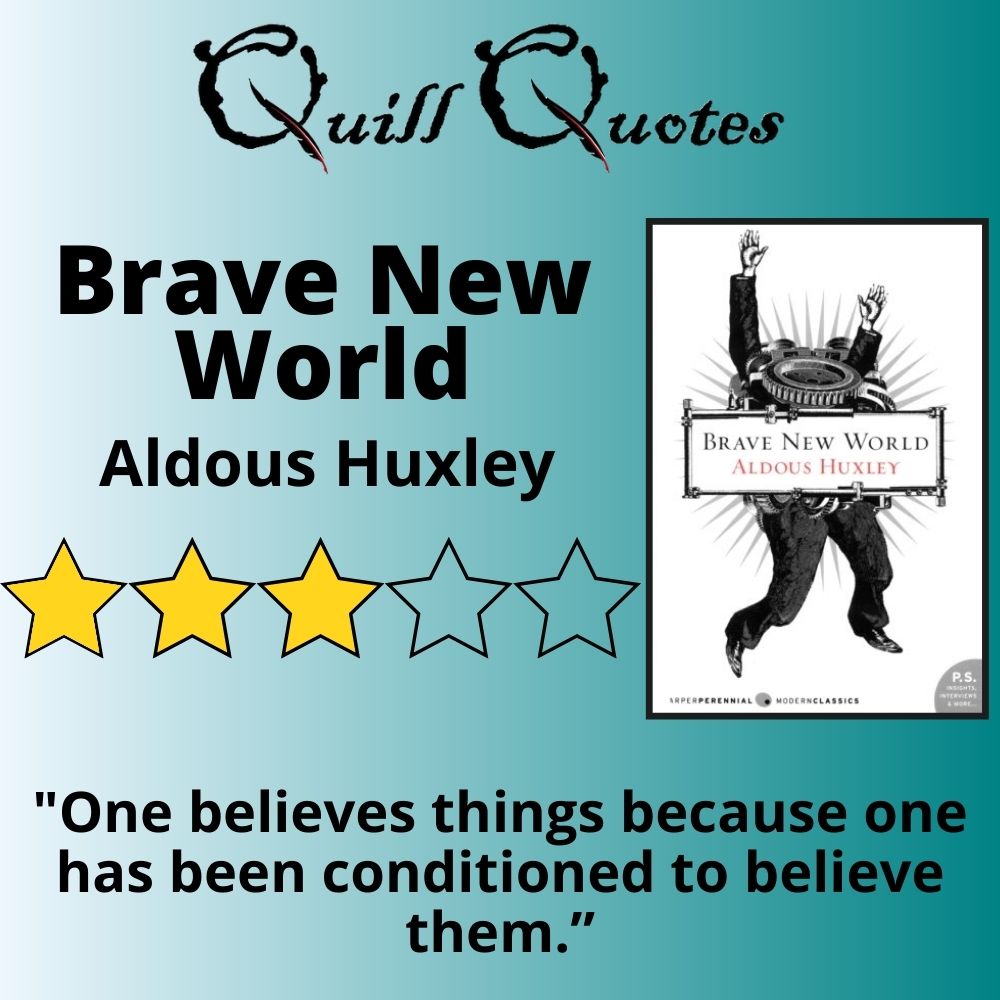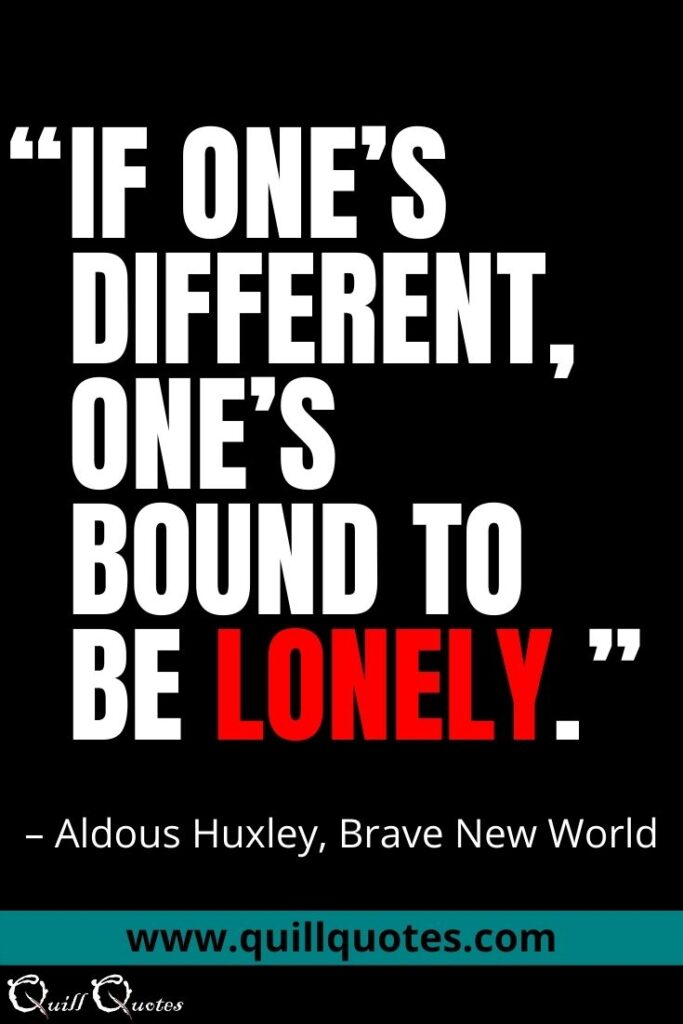Brave New World by Aldous Huxley has been on my reading list for a while among other dystopian sci-fi classics like 1984, Animal Farm, and Fahrenheit 451. Unfortunately, I enjoyed those others much more than Brave New World. As one of the first such stories published, I have to assume that Brave New World garners much of its literary success from being one of the first of its kind. However, I feel there are now many other books to choose from that better execute similar concepts leading to my 3-star rating.

Book Stats
- Title: Brave New World
- Author: Aldous Huxley
- Genre: Science Fiction, Classics, Dystopia
- Publication Date: 1932
- Pages: 288
- Est. Reading Time: 8 hours
- My Rating: 3/5 Stars
- Buy Now: Amazon or BAM!
Brave New World: Plot Summary
Brave New World is set in a future society where people are no longer born and parented in families but are created by genetic engineering in factories and raised for specific purposes by the World State. Each citizen has a predetermined class and job based on their designed level of intelligence and behavioral conditioning to maintain social order. Happiness and stability are paramount to the World State where consumerism, expensive sports, and sexual promiscuity are socially mandated, leading to a common saying “everyone belongs to everyone else” intended to prevent anyone from being denied what they want. Furthermore, should anyone’s desires be delayed, they’re provided a soothing, happiness-inducing drug called Soma.
When the central character, Bernard Marx, goes on vacation to a Savage Reservation in New Mexico where people still reproduce and live off the land, the World State society is quickly thrown into stark contrast. Bernard’s return to London brings new ideas and becomes a social experiment in the stability of the World State versus the conformity of individuals.
Brave New World: My Thoughts
There are certainly a lot of cool elements touched on, like consumerism, sexuality, happiness vs. freedom, censorship, individuality, and state control, but maybe a few too many to reach the depth I would have preferred. For instance, the consumerism aspect, where everyone is encouraged (essentially required) to frequently buy new clothes and play expensive communal sports to conform, made me think of The Forever War by Joe Haldeman where the “shore leave economy” concept is similar and more integral to the story. Coincidentally, sexuality is also a major theme of The Forever War!
Similarly, although censorship is only a small part of Brave New World, expanding on the concept of removing all literature containing upsetting concepts basically gives you the plot of Fahrenheit 451.
“You got rid of them. Yes, that’s just like you. Getting rid of everything unpleasant instead of learning to put up with it. Whether ’tis better in the mind to suffer the slings and arrows or outrageous fortune, or to take arms against a sea of troubles and by opposing end them…But you don’t do either. Neither suffer nor oppose. You just abolish the slings and arrows. It’s too easy.”
– Aldous Huxley, Brave New World
Happiness vs. Freedom
To me, the central theme seems to be society’s goal of universal happiness pitted against an individual’s freedom to make choices that may make them or others unhappy. It seems universally accepted that Huxley’s intended message sides with individual freedom. However, most people seem quite happy with the World State society and the few individuals who disagree fail to find happiness elsewhere. So, I’m left somewhat conflicted on the takeaway.
“I’m claiming the right to be unhappy.”
– Aldous Huxley, Brave New World
“Not to mention the right to grow old and ugly and impotent; the right to have syphilis and cancer; the right to have too little to eat, the right to be lousy; the right to live in constant apprehension of what may happen tomorrow; the right to catch typhoid; the right to be tortured by unspeakable pains of every kind.”
There was a long silence.
“I claim them all.”
With this in mind, I’m drawn to see this theme more as happiness vs. science, religion, and human progress. The suggested cost of universal happiness appears to be giving up scientific and religious pursuits which could unbalance society and generally abolishing goals for which there’s a chance of failing. Perhaps this approach would prohibit eventually reaching some other sci-fi type utopia but in many contexts feels far from the dystopia we’re meant to believe.
“Call it the fault of civilization. God isn’t compatible with machinery and scientific medicine and universal happiness. You must make your choice. Our civilization has chosen machinery and medicine and happiness.”
– Aldous Huxley, Brave New World
State Control
Likely what I found most interesting is the use of technology and coercion to maintain state control and the resulting comparisons to George Orwell’s 1984 where control is instead maintained by constant surveillance and fear. I didn’t notice this parallel until after I finished reading and looked at some other reviews but now I find it pretty fascinating. The fact that most of the population has been conditioned to want the World State society rather than forced into it is probably why it feels so different to me than other dystopias. Again, I find a lot of similarities to other works dealing with propaganda like Animal Farm and The Queue.
“A really efficient totalitarian state would be one in which the all-powerful executive of political bosses and their army of managers control a population of slaves who do not have to be coerced, because they love their servitude.”
– Aldous Huxley, Brave New World
“One believes things because one has been conditioned to believe them.”
– Aldous Huxley, Brave New World
However, this raises a very interesting question: is it a bad thing to be coerced into happiness? Is it still a dystopia if most people are content and non-conformers are treated fairly?
Favorite Quote
“If one’s different, one’s bound to be lonely.”
– Aldous Huxley, Brave New World
This quote really stuck out to me and I think can apply to the real world all too often. However, it seems to be another contradiction to the theme of individuality being preferred.

Brave New World: Final Thoughts
All in all, I’m glad I read Brave New World to understand its place in literary history but still feel many of its themes are better explored elsewhere with more entertaining storylines or more depth. I had been considering watching the Peacock original series adaptation but wasn’t hooked enough by the book to justify adding another streaming service. I’ll probably watch if it becomes free with ads though! I do plan to read Huxley’s 1958 essay Brave New World Revisited at some point to get the author’s thoughts on the themes and how our world is trending towards or away from his prediction. Since I find myself somewhat conflicted on the themes and the takeaway as a dystopia, I’m also intrigued to read Huxley’s novel Island which is said to be a utopian counterpart to Brave New World!
Have you read Brave New World by Aldous Huxley? Did you like it? How would you compare it to other classic dystopias like 1984, Animal Farm, or Fahrenheit 451?


Loved reading your thoughts on this book. It sounds amazing!
♥ Mae
Thank you! I hope you’ll get the chance to read it yourself sometime!
I read Brave New World in middle school, although I have no idea how I got my hands on it. It certainly wasn’t through school or friends.
I’ve always held it in very high regard but should probably re-read sometime as an adult.
The themes that I recall vividly are the bioengineeeing, the use of soma and the “love” for the system (and Ford!) that everyone seemed to have.
Huxley was a pioneer in many other ways too, so it’s no surprise this was one of the groundbreaking works at the time in the dystopian style that seems commonplace today. We certainly seem to be inching ever closer to such worlds!
Wow, in middle school! I was honestly a little surprised high schools still read it these days with how open sexuality is portrayed. I’m sure some schools have banned it but it’s definitely a valuable read from the literary history standpoint and Huxley’s many contributions.
Unfortunately, we do seem to be getting closer and closer to the dystopias we read about. Did you ever read Brave New World Revisited where Huxley discusses how the real world is behaving as he predicted in a nonfiction essay format? I actually enjoyed it more than Brave New World but don’t have my review done yet. Should be posted soon though!
Great review! It sounds like an interesting story. It’s not my cup of tea, but, lately, I’ve been trying new beverages (lol). Thanks for sharing!